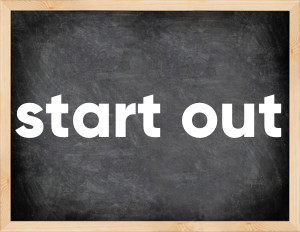 The English verb 'start out' is pronounced as [stɑːt aʊt].
The English verb 'start out' is pronounced as [stɑːt aʊt].
Related to:
phrasal verb.
3 forms of verb start out: Infinitive (start out), Past Simple - (started out), Past Participle - (started out).
Here are the past tense forms of the verb start out
👉 Forms of verb start out in future and past simple and past participle.
❓ What is the past tense of start out.
Start out: Past, Present, and Participle Forms
| Base Form | Past Simple | Past Participle |
|---|---|---|
| start out [stɑːt aʊt] |
started out [stɑːtɪd aʊt] |
started out [stɑːtɪd aʊt] |
What are the 2nd and 3rd forms of the verb start out?
🎓 What are the past simple, future simple, present perfect, past perfect, and future perfect forms of the base form (infinitive) 'start out'?
Learn the three forms of the English verb 'start out'
- the first form (V1) is 'start out' used in present simple and future simple tenses.
- the second form (V2) is 'started out' used in past simple tense.
- the third form (V3) is 'started out' used in present perfect and past perfect tenses.
What are the past tense and past participle of start out?
The past tense and past participle of start out are: start out in past simple is started out, and past participle is started out.
What is the past tense of start out?
The past tense of the verb "start out" is "started out", and the past participle is "started out".
Verb Tenses
Past simple — start out in past simple started out
(V2).
Future simple — start out in future simple is start out (will + V1).
Present Perfect — start out in present perfect tense is
started out
(have/has + V3).
Past Perfect — start out in past perfect tense is
started out
(had + V3).
start out regular or irregular verb?
👉 Is 'start out' a regular or irregular verb? The verb 'start out' is .
Examples of Verb start out in Sentences
- When I started out I never meant for it to end the way it did (Past Simple)
- We started out like Romeo and Juliet but it ended up in tragedy (Past Simple)
- It started out fine (Past Simple)
- No, they don't start out vicious at first (Present Simple)
- Couldn't begin to tell you, but I know I'm not just starting out (Present Continuous)
- He started out as a protector and benefactor to his people (Past Simple)
- They all start out saying that (Present Simple)
- I started out being his prisoner, now you're all on my back (Past Simple)